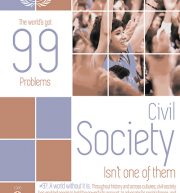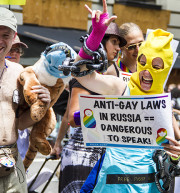
The Special Rapporteur’s factsheet summarizing the achievements of civil society over the past decade-plus, presented in an easy-to use “yes/no” format, with hyperlinks to source materials. This factsheet is based on the Special Rapporteur’s 2017 report to the Human Rights Council and features guidance on: • The connection between a vibrant civil society and a country's social, political and economic development. • The connection between civil society and democracy • Civil society's direct economic contributions • "What has civil society done for you lately?" - selected examples of civil society's important recent achievements, taken from the report • And more For the Special Rapporteur’s full factsheet series, please see:... Continue reading →

Has civil society made the world a better place? Where and when has civil society made concrete and identifiable achievements? What would the world look like without civil society? These are the central questions that the UN Special Rapporteur on the rights to freedom of peaceful assembly and of association, Maina Kiai, addresses in this, his final thematic report to the United Nations Human Rights Council. Throughout history and across cultures, associational life has enabled people to hold the powerful to account, to advocate for – and directly implement – progressive social changes, and to address many of the tensions inherent to collective human action. From the anti-slavery and anti-apartheid movements, to transnational advocacy campaigns against poverty and inequality, to women’s suffrage movements across the globe, to the countless thousands of human rights groups, grassroots and informal associations, and human rights defenders seeking to improve livelihoods and hold governments to account – the transformative power of civil society is seemingly self-evident. However, civil society’s role in changing societies for the better is deeply contested. The space for civil society globally is closing rapidly. In established democracies as well as autocratic regimes and states in... Continue reading →

The Special Rapporteur’s factsheet summarizing the rights to freedom of peaceful assembly and of association in the workplace, presented in an easy-to use “yes/no” format, with hyperlinks to source materials. This factsheet is based on the Special Rapporteur’s 2016 report to the UN General Assembly and features guidance on: • The importance of assembly and association rights in the workplace • International laws and standards which protect the rights to freedom of peaceful assembly and of association in the workplace • States’ responsibility to actively respect, protect, promote, and facilitate the enjoyment of fundamental rights – including labour rights • The impact of growing corporate power on workers' rights • Categories of workers most at risk of rights violations, including migrant workers, domestic workers, women and more • Examples of violations of workers' assembly and association rights drawn from the report • And more The factsheet also summarizes selected recommendations from the report and highlights key statistics in a “by the numbers” feature. For the Special Rapporteur’s full factsheet series, please see:... Continue reading →

The Special Rapporteur’s factsheet summarizing fundamentalism and its impact on the rights to freedom of peaceful assembly and of association, presented in an easy-to use “yes/no” format, with hyperlinks to source materials. The factsheet also addresses the related but distinct phenomenon of "extremism" and how assembly and association rights can help stem its spread. This factsheet draws from the Special Rapporteur’s 2016 report to the UN Human Rights Council and features guidance on: • The definition of various "fundamentalisms," including market fundamentalism, political fundamentalism, religious fundamentalism and national/cultural fundamentalism • How fundamentalism can motivate violations of the rights to freedom of peaceful assembly and of association • States' responsibility to prevent the negative impacts of fundamentalism on the enjoyment of assembly and association rights (including their duty to prevent abuses of these rights by non-State actors) • Examples of fundamentalism drawn from the report • Selected recommendations from the report • And more For the Special Rapporteur’s full factsheet series, please see:... Continue reading →

In recent years, there has been a perceived rise in the expression of fundamentalism in many contexts across the world. Despite the frequent use of the term, “fundamentalism” remains a word that is rarely defined with any specificity. Common use generally centers on religious fundamentalism, and this is perhaps what comes to mind first for most people. But fundamentalism can encompass much more than religion, and in this report the Special Rapporteur takes a much broader view of the term. He believes that fundamentalism can and should be defined more expansively, to include any movements – not simply religious ones – that advocate strict and literal adherence to a set of basic beliefs or principles. Adherence to the principles of free market capitalism, for example, has spawned what has been called “market fundamentalism.” And the unbending belief in the superiority of one ethnic group, race, tribe or nationality can lead to what might be called “nationalist fundamentalism.” Numerous other examples are detailed in this report. This report is not concerned with fundamentalist viewpoints per se, but rather with fundamentalism in action: concrete, specific violations of the rights to freedom of peaceful assembly and of association that are motivated by these viewpoints. The mere voluntary... Continue reading →

The Special Rapporteur’s factsheet summarizing the rights to freedom of peaceful assembly and of association in the context of natural resource exploitation, presented in an easy-to use “yes/no” format, with hyperlinks to source materials. This factsheet draws heavily from the Special Rapporteur’s 2015 report to the UN Human Rights Council and features guidance on: • The obligation of States and corporations to uphold assembly and association rights in the context of natural resource exploitation • States' responsibilities regarding private security firms and violations of human rights by corporations • The issue of blanket bans on peaceful assemblies surrounding natural resource exploitation operations • The rights of unregistered associations to participate in consultation processes • And more The factsheet also summarizes the report’s recommendations, highlights key statistics in a “by the numbers” feature, and looks at the current international legal and regulatory framework for the sector. For the Special Rapporteur’s full factsheet series, please see:... Continue reading →

The global economy relies heavily on the availability and exploitation of natural resources. With that demand has come a plethora of concerns relating to the sustainability of economic growth and its impact on the climate, the environment and, more generally, on human rights. Despite the high stakes, citizen engagement in the natural resources sector is notoriously difficult. Secrecy cloaks decision-making processes and outcomes; there is a lack of mechanisms through which interested parties may express their concerns; discussions are often highly technical; and, above all, the financial stakes are often massive. This opaque and lucrative environment presents ideal conditions for corruption to thrive, a challenge with which many resource-rich countries have to contend. In this report, Special Rapporteur Maina Kiai examines the role that the rights to freedom of peaceful assembly and of association play in opening space for genuine and effective participation across the spectrum of natural resource exploitation activities. He also examines how these rights help foster increased transparency and accountability, facilitate constructive dialogue, and ultimately form the basis for people’s ability to secure other substantive rights. “The significance of civil society as a stakeholder in the context... Continue reading →

In Special Rapporteur Maina Kiai's previous reports, he has focused on States’ obligations to ensure the free exercise of the rights to peacefully assemble and to associate at the national level. In this report, the Special Rapporteur examines the exercise of these rights at the international level – specifically in the context of multilateral institutions. Increasingly, global governance is becoming fragmented and diffused among a broad range of multilateral entities, ranging from well-known bodies such as the United Nations and World Bank to lesser-known ones. The decisions of these institutions can have a profound impact on the lives of ordinary people across the globe as these institutions institute development projects, spur economic and political reform, help shape international law, and more. Yet much of this impact upon ordinary people occurs without ordinary people’s input. The rights to freedom of peaceful assembly and of association are equally fundamental and protected at the national and multilateral levels. Yet civil society is far too often excluded from international debates; multilateral institutions commonly view peaceful assemblies during global summits or when implementing a project as posing a security threat; the operations of many multilaterals lack transparency; and... Continue reading →

Backlash from the Arab Spring of early 2011 continues to be felt globally, with space for civil society actors increasingly shrinking. In recent years many States have responded to people’s assertions of peaceful dissent by violently clamping down on peaceful protests and other forms of assembly, unduly restricting the ability of associations to form and operate, and physically assaulting civil society actors. While those actions have negatively affected all who exercise their rights to peacefully assemble and freely associate, certain groups are at particular risk of having their space all but vanish. In this report, UN Special Rapporteur Maina Kiai focuses on the challenges facing groups that are often relegated to the margins of society, both in their daily lives and in the exercise of their rights to freedom of peaceful assembly and of association. He hopes to cast the spotlight on the ways in which the denial of the rights to freedom of peaceful assembly and of association leads to the marginalization of those groups and how marginalization exacerbates their inability to effectively exercise their rights. Some of the groups that are considered in the present report to be most at risk are persons with disabilities; youth, including children; women; lesbian, gay, bisexual, transgender and intersex... Continue reading →